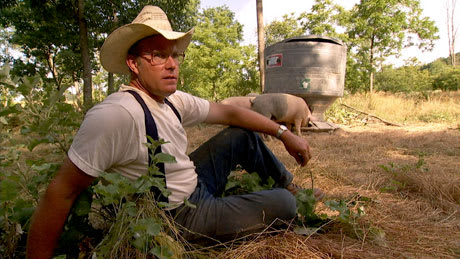Food, Inc. is a documentary that aims to do to the food industry what An Inconvenient Truth did to global warming. To that end, it employs authors Eric Schlosser (Fast Food Nation) and Michael Pollan (The Omnivore's Dilemma) to help illuminate and expose the food production system that's controlled by corporate monopolies, supported by the government and poses serious health and environmental risks.
The film offers a many-sided attack on this corrupt system and profiles some individuals who are fighting against it. It ties together seemingly diverse issues such as factory farming, the genetic modification of crops, the increase in diabetes sufferers, the exploitation of an illegal immigrant work force, the rise in E-Coli outbreaks, the over-subsidization of U.S. corn that drives down meat and junk food prices while flooding foreign markets and under-cutting local farmers, and the cosy relationship between food-related corporations and the government overseers who are supposed to be protecting the public.
Food, Inc. makes these complex issues accessible to a wide audience by using an odd combination of cutesy, graphic and gross meat processing shots, breaking it into bite-sized sections that tackle one facet of the industry, humanizing each segment by focusing on an individual deeply affected by the issue at hand.
From the chicken farmer cut off from the company for insisting on windows in her barns to the mother fighting for stricter food inspections after losing a child to E-Coli to the farmer being sued by Monsanto for growing non-GMO crops, the film highlights many David versus Goliath-type stories. Unfortunately, in most of these cases Goliath seems to be winning.
It's a lot of doom and gloom, looking at a system that's incredibly entrenched, and a lot of rich and powerful people who are invested in its continued success, though the film points to the tobacco industry as a glimmer of hope in changing public perception and dismantling a powerful industry's stronghold. It also highlights the burgeoning organic farming movement as an indication of the power of consumer demand to affect positive change.
Like An Inconvenient Truth, the film ends with a list of the little things we can do to help but after being inundated with the magnitude of these systemic problems for a couple of hours, it's hard to feel very hopeful at all.
(Alliance)The film offers a many-sided attack on this corrupt system and profiles some individuals who are fighting against it. It ties together seemingly diverse issues such as factory farming, the genetic modification of crops, the increase in diabetes sufferers, the exploitation of an illegal immigrant work force, the rise in E-Coli outbreaks, the over-subsidization of U.S. corn that drives down meat and junk food prices while flooding foreign markets and under-cutting local farmers, and the cosy relationship between food-related corporations and the government overseers who are supposed to be protecting the public.
Food, Inc. makes these complex issues accessible to a wide audience by using an odd combination of cutesy, graphic and gross meat processing shots, breaking it into bite-sized sections that tackle one facet of the industry, humanizing each segment by focusing on an individual deeply affected by the issue at hand.
From the chicken farmer cut off from the company for insisting on windows in her barns to the mother fighting for stricter food inspections after losing a child to E-Coli to the farmer being sued by Monsanto for growing non-GMO crops, the film highlights many David versus Goliath-type stories. Unfortunately, in most of these cases Goliath seems to be winning.
It's a lot of doom and gloom, looking at a system that's incredibly entrenched, and a lot of rich and powerful people who are invested in its continued success, though the film points to the tobacco industry as a glimmer of hope in changing public perception and dismantling a powerful industry's stronghold. It also highlights the burgeoning organic farming movement as an indication of the power of consumer demand to affect positive change.
Like An Inconvenient Truth, the film ends with a list of the little things we can do to help but after being inundated with the magnitude of these systemic problems for a couple of hours, it's hard to feel very hopeful at all.




